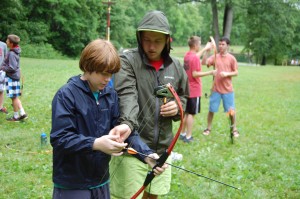AUTHOR ARCHIVES: Phil
The Wonders of Reality Discipline
Posted by PhilEnjoy this excellent article from Focus on the Family…
This clever discipline method is less exhausting and more successful than ranting, raving, blaming, pleading, begging or threatening.
I once read a newspaper headline that made me chuckle: “Red Lipstick Empowers Women.” The caption, coupled with a photo of Marilyn Monroe wearing a white flowing dress and painted crimson lips, made me think that perhaps I’d found the answer to the discipline problems with my elementary students. That’s been my problem all along — I’ve been wearing champagne pink!
Wouldn’t it be wonderful if changing lipstick was all it took to become more effective and empowered in handling discipline problems with children?
While child psychologist Dr. Kevin Leman is an out-of-the-box parenting problem solver who might buy into the lipstick method if it worked, Dr. Leman instead teaches parents about the effective “Reality Discipline.” This clever method of getting little “ankle biters” to obey is less exhausting and more successful than ranting, raving, blaming, pleading, begging or threatening.
It’s all about responsibility
The first thing to remember about Reality Discipline is that you want your children to learn to think for themselves and learn to become more responsible through guidance and action-oriented techniques. In an article from First Things First, Dr. Leman says, “Action-oriented discipline is based on the reality that there are times when you have to pull the rug out and let the little buzzards tumble. I mean disciplining your children in such a way that he/she accepts responsibility and learns accountability for his actions.” Here’s an example.
When my brother was in high school, my mother implemented Reality Discipline without realizing it. My little brother, Gannon, could sleep through a tornado (or a hurricane or tsunami) and my mother was tired of waking him up every morning and saying, “You’d better hurry, or you’re going to miss the bus.” Finally, Mom thought, I’m not waking him up anymore. He can be late. Just as she suspected, Gannon did miss the bus and was forced to walk the mile to school. Much to my mother’s delight, he was never late again. She didn’t have to beg, plead, give him ultimatums or nag Gannon one more time. Instead, she let reality do the discipline.
A little bit of ice cream can do the trick
One afternoon, I had the privilege of listening to Dr. Leman explain on the radio how reality discipline teaches responsibility. He told an engaging story about a mother whose preschool son was driving her bananas because every day when she stopped to pick him up from preschool, he ran from her on the playground. She felt like a fool for being outrun by a preschooler while teachers and parents looked on. Desperate, she asked Dr. Leman for advice.
Dr. Leman suggested that if her son ran from her next time, she should ask another adult on the playground if they would be kind enough to keep an eye on her son for a few minutes. Then she should drive away, go to the nearest ice cream shop, purchase a cone for herself and drive back to the school to pick up her son. Then, when her little guy got in the car and asked, “Where’s my ice cream?” he told the woman she should cheerfully say, “Well you could have had some ice cream, but you ran away; so I had to go get some alone.”
One point for mom; zero for Junior. That’s Reality Discipline. No ranting. No raving. No warnings. Just cool, collected action with some quick, clever thinking to make your point loud and clear.
Sounds great, right? Here are some basic principles of Reality Discipline to help you get (and keep) the upper hand with your kids.
Don’t focus on creating a happy child
In his book Have a New Kid by Friday, Dr. Leman says that the goal of parenting is not to create happy kids; rather, it’s to create responsible kids. This means Junior will probably be pretty unhappy that he didn’t get an ice cream cone; he may even throw a fit, and rant and rave — but he will become more responsible and respectful. Don’t back down, but do stay cool as a cucumber. Remind yourself that it’s a battle of the wits and the wills, and you will win.
Understand your child’s reality
According to Dr Leman, if you want to use Reality Discipline effectively, you need to know what’s important to your child — what really moves him in his reality. Your child may value money, sports, a daily cookie break, staying up late or spending time with friends. Parents who know how to use Reality Discipline make creative connections between bad behavior and discipline through action rather than through warnings, nagging or threats.
For example, suppose you ask your ten-year-old daughter (who loves saving money) to take out the trash. She ignores you, and thirty minutes later the trash is still sitting by the back door. With a little creativity, you decide to implement some Reality Discipline. Instead of reminding your daughter about the trash, you enlist her younger sister to take it out . Then you take some money out of your ten-year-old daughter’s allowance and give it to her sister for a job well done. Can you imagine the peace and satisfaction that could come from being such a quick-witted parent?
Note: If you want to use Reality Discipline, you have to listen to your child. Then you’ll know what will move him to responsibility. The more you understand what’s important to him, the more ammunition you’ll have in your arsenal to “train up” your child in the way he should go.
Make sure that Reality Discipline is grounded in love
In Have a New Kid by Friday, Dr. Leman writes, “Show me a mean teacher, and I’ll show you a good one.” If you find that you are a permissive parent who is afraid of “pulling the rug out from under your child” as Dr. Leman suggests, remember that Reality Discipline is not unkind. Instead, when it’s motivated by love to help your child mature into a responsible adult, it’s a very good gift.
Posted in Just For Parents | Tagged Camp Crestridge, Camp Ridgecrest, Focus on the Family, parent articles, Ridgecrest Summer Camps | Leave a reply
Conversation Starter: Victorious
Posted by Phil Romans 7:20–8:9
Romans 7:20–8:9
Holy Spirit helps us live victoriously over sin
Conversation Starters
How can you keep this conversation going at home? Try bouncing some of these questions around at the dinner table, as you’re driving your kids to school or an activity, or even while you’re shopping together:
For Preschool
What is your favorite game to play with your friends? How do they help you win the game?
For Children
What are some things you like doing with other people? What makes that so special? How do you see God helping you make good choices about right and wrong? How can you lead your friends toward making wise choices?
For Students
Who is someone you think never struggles with internal battles with sin? Why? How does knowing Paul struggled with that conflict make you feel? How does knowing the Spirit can help you experience victory over sin make you feel?
Posted in Just For Parents | Tagged Camp Crestridge, Camp Ridgecrest, Conversation Starters, parent resources, Ridgercest Summer Camps, Romans 7:20–8:9 | Leave a reply
Beating Cabin Fever with Kids
Posted by Phil To the tune of “Home on the Range”: Home, home another day; the skies are cloudy and gray; the kids will not sit, there are no more craft kits, and the wind is too whipping to play. When the first winter school cancellation keeps you home, you thank God for the downtime. After several weeks of overcast days, boredom hits. Try some simple activities to get off the couch and make memories.
To the tune of “Home on the Range”: Home, home another day; the skies are cloudy and gray; the kids will not sit, there are no more craft kits, and the wind is too whipping to play. When the first winter school cancellation keeps you home, you thank God for the downtime. After several weeks of overcast days, boredom hits. Try some simple activities to get off the couch and make memories.
- Get out puppets or costumes and act out favorite Bible stories or children’s books.
- Learn a new board game or play an old favorite.
- Work on a puzzle together. Use a card table so you won’t have to put the work-in-progress away prematurely.
- Read a family novel. Mom or Dad can read one or several chapters every time a school day or event is cancelled. Be sure to pull out blankets and make popcorn to make reading time something to look forward to.
- Make exercise flash cards together. Draw stick figures and write words indicating which exercise to do, such as five sit-ups or 10 jumping jacks. Play with the cards in different ways throughout winter – hide them around the room and find them or let someone draw which ones to do.
- Work on a handcrafted item together, such as sewing a baby quilt, crocheting a scarf, or assembling a birdhouse.
- Create an age-friendly scavenger hunt (indoors or outdoors).
- Learn a new song together as a family – von Trapp style!
- Have “brain blizzards.” See who can think of the most crazy uses for winter gear, such as boots, snow shovels, or even snow.
- Make snow angels. If you live where there is no snow, purchase instant snow at an educational store and have fun experimenting with it.
When life gives you lemons
Winter months are citrus season. Watch for specials on oranges, lemons, grapefruit, and limes.
- Make fresh lemonade.
- Make a citrus salad. Teach your child how to peel, separate, and slice the fruit and stir 3 to 4 cups of several kinds together with ½ cup of sour cream and ½ cup of whipped topping.
- Slice citrus in half. Make prints by dipping the sliced fruit face into fingerpaint and pressing it onto paper.
- Have a smelling and tasting contest – blindfolded!
This article is courtesy of ParentLife magazine.
by Kristen White on Thursday, December 29, 2011
Posted in Just For Parents | Tagged Camp Crestridge, camp parent, Camp Ridgecrest, Ridgecrest Summer Camps, snow days | Leave a reply
Conversation Starter: Free
Posted by Phil Living Beyond Yourself
Living Beyond Yourself
John 16:5-15
Holy Spirit points us to our need for Christ and how we can receive Him
Conversation Starters
How can you keep this conversation going at home? Try bouncing some of these questions around at the dinner table, as you’re driving your kids to school or an activity, or even while you’re shopping together:
For Preschoolers
This week, spend some time talking with your preschooler about what makes God special. Emphasize things like “God loves you,” “God gives us what we need,” “God protects us,” and so forth.
For Children
What kinds of freedoms do we enjoy in our country? What sacrifices did people have to make so we could have those freedoms? How are these freedoms similar or different from the freedom God provided when Jesus died on the cross?
For Students
Why do we spend so much time trying to be free? When have really felt like you were really free?
If you had to describe the Holy Spirit to a friend, what would you say?
What is the hardest thing for you to understand about the Trinity?
Posted in Just For Parents | Tagged Camp Crestridge, Camp Parents, Camp Ridgecrest, Conversation Starters, John 16:5-15, Just for Parents, Ridgecrest Summer Camps | Leave a reply
The best ways to pray with children
Posted by Phil Recently in the prayer class I lead at our church in Oklahoma City, I was explaining to the new children why we take one Sunday a month from their regular lessons to focus on prayer. “We want you to know God, not just know about Him, and hear God, not just hear about Him,” I explained.
Recently in the prayer class I lead at our church in Oklahoma City, I was explaining to the new children why we take one Sunday a month from their regular lessons to focus on prayer. “We want you to know God, not just know about Him, and hear God, not just hear about Him,” I explained.
Eight-year-old Andrew, who has been in prayer class for several years, piped up to help get the idea across: “It’s like me and President Bush. I’ve seen him on TV lots of times, especially since 9-11, and read about him in the newspaper, and heard my parents talking about him. But I have never had a conversation with President Bush, so I don’t really know him, do I?”
Andrew was exactly right. If we want our children to know God and not just know about Him, we need to teach them to pray and pray with them. Children could do all kinds of worksheets about God and hear stories about Him, but it is when they talk and listen to God that they begin to know His heart.
Children need to know early in their lives that they can talk to God just like they talk to Mommy, Daddy, or a best friend. They need to understand that God is there and attentive to what they have to say. Instead of putting them on hold or playing a recorded message, God is always willing to listen – whether they are on the playground, at a friend’s house, in the car, or at church.
You can pray …
Heart to heart – Share with your child a time that you prayed and received the answer in a surprising or dramatic way.
On the spot – The next time your child comes to you with a problem or worry, instead of saying, “I will pray for you,” do it right then. Even if it is a short prayer, you will be demonstrating the important principle that God wants us to cast the care of all our concerns on Him and pray about everything.
Through the newspaper – Pass out sections of the newspaper and ask each child to come up with one concern to pray about.
Modeling: How to learn prayer
One of the first ways children learn the importance of prayer is hearing their moms and dads pray. Since Josh was born, his dad would pray for him each night at bedtime, asking for God’s protection and love to fill his heart. When Josh turned 2 years old, his parents added a short nightly reading from his Bible. Shortly after age 2, Josh began to join in by looking around his room and naming everything he could see to thank God for – blankets, puppy, Mommy, Daddy, new shoes, toys, the nightlight, eyes, ears, nose. He thanked God for the most interesting items! But it was not only Josh that was growing spiritually. Hearing her son’s simple prayers, Josh’s mom, Sandy, could not remember the last time she thanked God for her sight, hearing, shoes, clothes, and all the other blessings in her life.
Get out of the ruts of prayer
One way to banish the “nothing to pray for” or “prayer is boring” complaint is to get out of the ruts of prayer by using prayer targets and making prayer active. Use a game I call “Musical Prayers.” Place a chair for each participant in a circle. Tape a prayer target to each chair. Begin playing music and have everyone walk around the chairs. When the music stops, each person finds the nearest chair and prays for that need.
Use an inflatable world globe and pass it from person to person. When the music stops, the person holding the globe can choose a country and pray for the children in that country to know about Jesus.
Take your children on a prayer walk. Children are terrific prayer walkers because they enjoy movement and being “on site” makes the prayers more meaningful and concrete. To begin, walk around your neighborhood and ask God’s blessing and salvation on each family. Pray for the children in each home.
Give children the freedom to talk to God in different postures: sitting, standing, kneeling, marching, or bowing. When you have family prayer time, allow each person to choose a different posture in which to pray.
Pray a blessing
Praying a prayer of blessing on your child’s life each night at bedtime (or other times of the day) can bring comfort, reassurance, and hope to your child’s heart. Pray for God’s favor, protection, and peace. Thank the Lord for something specific – a gift, talent, or quality in your child. You can use a Bible blessing such as Psalm 5:12 or Numbers 6:25 or speak from your heart. When you pray scriptural blessings, you are speaking words that match God’s desire for your child.
Thanksgiving
An essential part of prayer is simply saying, “Thank You, God.”
Blessing basket – Fill a small basket with little slips of paper. Encourage family members to write or draw pictures of things for which they are thankful.
Best part of the day – Ask each child to say a sentence prayer, thanking God for the best part of her day.
Family journal – Keep a notebook full of things for which the family is thankful.
As you try different ways of connecting with God, children will learn that prayer is one of the greatest adventures in life – to call on the God of the universe and then to hear from Him. As Jeremiah 33:3 says: “Call to Me and I will answer you and tell you great and wondrous things you do not know.”
by Cheri Fuller on Tuesday, September 27, 2005
Posted in Just For Parents | Tagged Camp Crestridge, Camp Parents, Camp Ridgecrest, parent articles, Ridgecrest Summer Camps | Leave a reply
Conversation Starters: Choose to Change
Posted by Philmake the decision to follow God’s ways
Conversation Starters
How can you keep this conversation going at home? Try bouncing some of these questions around at the dinner table, as you’re driving your kids to school or an activity, or even while you’re shopping together:
For Preschoolers
Show me things in this room that are the most special to you. Why do you love that toy/book/person so much? Can you guess what is most special to me in this room? Guess what’s most special to God in this room. (Use this discussion to emphasize that your child is God’s special possession.)
For School-Age
Does it seem like kids who misbehave get most of the attention in school? How does that make you feel? Is it worth it to keep behaving and doing your work even when you don’t always get noticed and rewarded? Why? (Point out from Malachi 3:16 that God takes notice when they do the right thing.)
For Students
How much contact do you have with other Christians during the week? When do you get a chance to talk about God? How do you and your Christian friends support one another to keep living for God?
Posted in Just For Parents | Tagged Camp Crestridge, Camp Ridgecrest, Conversation Starters, Malachi 3:13–4:6, Ridgecrest Summer Camps | Leave a reply
Answering Tough Questions from Kids about God
Posted by Phil “Hey, Mom?” my son said one day. “If killing is wrong, then why did God help David kill Goliath?” Whoa! My child was only 3 years old! I was not expecting questions like this for at least seven more years. Over the next few weeks, he asked even more questions, such as “If Jesus is God’s Son, then who is God’s wife?” and “So Jesus and God are kind of the same but kind of different. How does that work?
“Hey, Mom?” my son said one day. “If killing is wrong, then why did God help David kill Goliath?” Whoa! My child was only 3 years old! I was not expecting questions like this for at least seven more years. Over the next few weeks, he asked even more questions, such as “If Jesus is God’s Son, then who is God’s wife?” and “So Jesus and God are kind of the same but kind of different. How does that work?
Children are curious. Like it or not, you are going to be faced with tough questions from little seekers. At times, it can be overwhelming. After all, theologians and scholars have been debating the answers to some of these questions for centuries, so how can you be expected to know the answers and communicate them to children in a way that makes sense? The next time you find yourself stumped by a child’s question, keep the following guidelines in mind.
Encourage children to ask questions
When you feel you do not have the time or energy to get into difficult questions, it is tempting to reply with a quick, “That’s just the way it is” or “Because God said so.” But resist the temptation to be flippant or to blurt out responses that ultimately discourage children from asking questions. Children are genuinely curious about their world, and we need to create an environment that encourages them to seek the truth. When you do, you foster a lifelong desire to continue learning more about God.
Communicate at the child’s level
When answering a child’s tough questions about God, always take into consideration his age and maturity level. Use words and concepts that he can understand and that do not cause additional confusion. This may mean that at times you simplify an issue, such as the Trinity or Christ’s incarnation, to its most basic facts.
Do not be afraid to say you do not know the answer
Instead, join the child in discovering the answer to his questions. Feel free to say: “I’ll have to look that up and get back to you” or “I’m not sure how to answer that. Let’s find the answer together.” It is beneficial for children to see that you are not a supreme know-it-all but that you, too, are still learning about God and growing in your understanding of spiritual concepts.
Help an older child look up answers himself
Pointing children to resources available to them lays the foundation for a lifetime of seeking answers to the hard questions. Stock your bookshelf with a good Bible dictionary and commentary. Show the child how to look up the answer and discuss it with him.
Pray for spiritual understanding
A child’s understanding of spiritual matters is primarily influenced by the Holy Spirit. The Bible makes it clear that the concepts relating to God and His ways are not always easy to understand. Pray that the child’s spiritual eyes, as well as your own, will be opened to God’s truths.
My son is now 7 years old and the questions keep coming! But rather than feel frustrated, I look forward to hearing what he asks next, and I am excited to watch him learn even more about God.
by Katrina Baker on Tuesday, September 26, 2006
Posted in Just For Parents | Tagged Camp Crestridge, Camp Ridgecrest, Just for Parents, parent resources, Ridgecrest Summer Camps | Leave a reply
Video: Raising Radical Kids!
Posted by PhilParents! As we continue to partner with you as you raise your children, we are always on the lookout for solid resources and encouragement from some of the most godly fathers and sons that we know. We hope that you enjoy this 5 minute video with some really great ideas…
Posted in Just For Parents | Tagged Camp Crestridge, Camp Ridgecrest, LifeWay, parent resources, Parenting Teenagers, Raising Radical Kids!, Ridgecrest Summer Camps | Leave a reply
Conversation Starters: Recognize God’s Gift
Posted by Phil John 1:1-4,10-18
John 1:1-4,10-18
[Jesus is completely God, completely man, and completely necessary]
How can you keep this conversation going at home? Try bouncing some of these questions
around at the dinner table, as you’re driving your kids to school or an activity, or even
while you’re shopping together:
For Preschoolers
• Give each family member an opportunity to discuss their all-time favorite Christmas gift.
What made that gift special? Who gave you that gift?
For School-Age
• Your school-aged child may have a hard time realizing that the baby Jesus we emphasize
so much at Christmas grew up just like we do. Use the Scripture references from the feature
on page 9 to talk with your child about the humanity of Jesus.
• When you picture Jesus, do you picture Him as a baby in the manger, teaching and doing
miracles, or on the cross?
For Students
• When you look at a lot of other religions, they don’t believe that Jesus is truly God. Why do
you think it matters?
Posted in Just For Parents | Tagged Camp Ridgecrest, Cmap Crestridge, Conversation Starters, parent resourses, Ridgecrest Summer Camps | Leave a reply
Conversation Starter: Objection – Frustrating the Father
Posted by PhilConsidering How We Treat God
Conversation Starters
How can you keep this conversation going at home? Try bouncing some of these questions around at the dinner table, as you’re driving your kids to school or an activity, or even while you’re shopping together:
For Preschoolers
How big is God? How can we show a big, big God that we love Him?
You may want to tell about Jesus feeding a big crowd with the lunch that the little boy gave Him. Emphasize that God likes to use gifts from little children to help people. Helping other people and giving money to our church are two ways we can show God we love Him.
For School-Age
Do you ever see kids mistreating their teachers or parents?
How do you feel about that?
Do you think we ever treat God badly like that?
What are ways we can treat God with respect and show Him we love Him?
For Students
If you can catch them in the car without their earbuds in, play Waiting for the World to Change by John Mayer. Draw attention to a phrase such as “It’s hard to beat the system when we’re standing at a distance. So we keep waiting, waiting on the world to change.” Discuss questions such as: Should we wait on the world to change or go do something about it? If you could change one thing in this world, what would you? What can we as a family do to change our corner of the world and make life better for someone else?
Posted in Just For Parents | Tagged Camp Ridgecrest, Conversation Starters, LifeWay, Malachi 2:17–3:12, Ridgercest Summer Camps | Leave a reply


